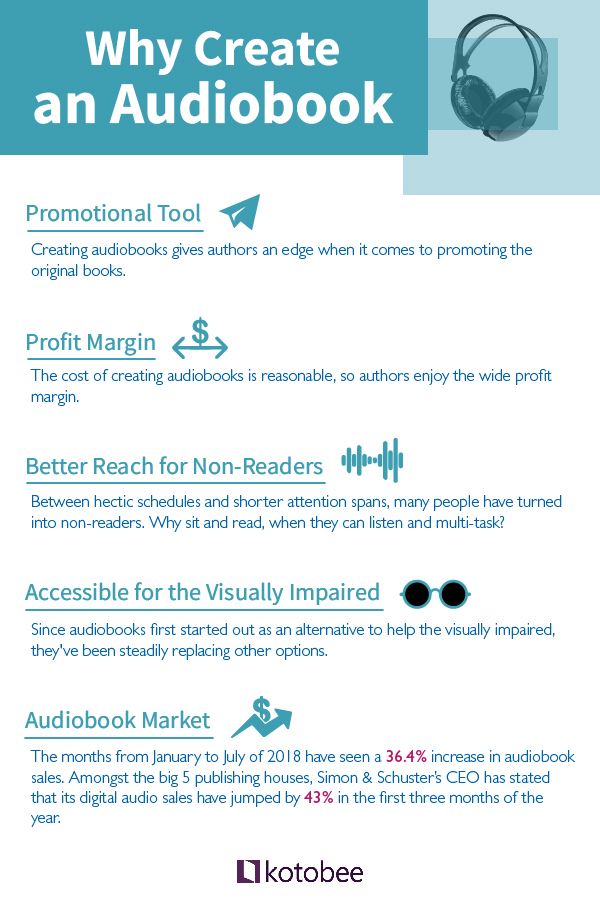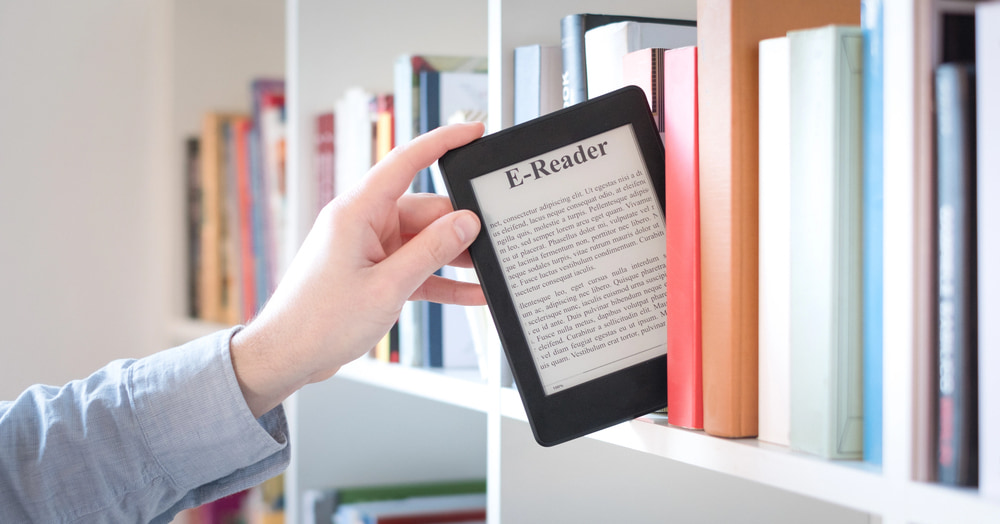Why and How to Convert Your Ebook to Audiobook
You’re writing an ebook and your mind is buzzing with all the tasks that lay before you. Adding audiobooks to the list may not be on your mind, but making audiobooks is easy, profitable, and a good business idea.
Audiobook sales in 2021 were estimated to be around $1.6 billion in the US alone. Don’t worry if you don’t know much about audiobooks and how to go about converting and marketing your own, we’ve got you covered in this article, so keep on reading!
What Are Audiobooks?
Audiobooks are voice recordings of books being read aloud, often by professional narrators or even the authors themselves. They allow listeners to immerse themselves in a story or absorb information without needing to sit down with a physical book.
With the rise of smartphones and apps, countless apps make it easy to listen to audiobooks. Many of them offer features like bookmarking, note-taking, and adjustable playback speeds, making the experience even more personalized.
Generally, audiobooks are designed to be listened to without the book present. Kindle App’s Immersion Reading, for example, syncs an ebook with its audiobook so readers can follow along. Kotobee Author allows authors to create ebooks and embed audio files, which readers can then play as they read. Sounds ordinary, so why the big craze?
Why People Are Crazy About Audiobooks
The popularity of audiobooks seems to be growing over the years, but why is that? Well, here are some of the reasons:
Easy to Get Through
Let’s face it, we all have what seems to be a million and one things on our to-do lists and at times the tasks may seem rather daunting. According to Edison Research’s National Survey of American Audiobook Listeners, of the activities people do while listening to audiobooks, housework leads with a whopping 68%. As we do our chores, run errands, or do a myriad of other things, we listen to books, thus enjoying ourselves and getting one more book off of our TBR (to be read) pile!
Entertaining
Take this audiobook narration of Alice in Wonderland by Scarlett Johansson for example; doesn’t it sound fun? Or Anna Kendrick’s own autobiography narrated by her in Scrappy Little Nobody’s audiobook. Do you hear my drift? They sound entertaining to me. Trained voiceover actors and the books’ actual authors make the best recitations.
Easy to Find
Countless platforms sell audiobooks and allow you to listen to free samples: Audible.com, Google Play, Kobo, and Audiobooks.com. Libraries let people borrow audiobooks via OverDrive. Companies and individuals post audiobook podcasts on their websites. Simply, audiobooks have become ubiquitous.
Easy to Play
A large reason behind the increase in audiobook sales can be primarily attributed to how easy it became to listen to them. You can carry hundreds of audiobooks and listen to them on the go. In homes, voice assistants such as Alexa and Amazon Echo help with playing audiobooks out loud, as well as customizing preferences and recommending books depending on previous choices, likes, and dislikes.

Why Create an Audiobook
Now that we’ve established why people like audiobooks so much, let’s look at it from the authors’ (or publishers’) perspective. Why should you create audiobooks, and how are they going to benefit you? Here are some answers:
Promotional Tool
Creating an audiobook gives authors an edge when it comes to promoting their books. During the book launch, audiobook teasers are sometimes released prior to the ebook to build suspense and hype.
Profit Margin
Because the cost of creating audiobooks is reasonable, authors enjoy a wide profit margin. I’d like to say as long as you’re not hiring Morgan Freeman you’ve got no worries about costs, but there are services out there with exorbitant rates. Do your research and you’ll be glad to have an extra source of income.
Better Reach for Non-Readers
Between hectic schedules and shorter attention spans, many people have turned into non-readers. They don’t have the patience to sit down and read when they can listen and multi-task instead. With audiobooks, it’s gain with no pain.
Large Market
Audiobooks initially started back in the 1930s to help the visually impaired and were, in fact, the first use for LPs. For decades audiobooks were neglected, till technology caught up in the 1980s and the audiobook industry took off. In recent years audiobooks enjoyed another boom in sales, with sales doubling in the past five years alone.
Accessible for the Visually Impaired
Since audiobooks first started out as an alternative to help the visually impaired, they’ve been steadily replacing other options. As few as 4% of the blind and partially sighted population of children in the UK learn to read Braille. Audiobooks have become the preferred format for visually impaired persons.
How to Create an Audiobook
With everything you’ve just read, wouldn’t you like to capitalize on that market? Don’t worry, we’ll tell you how to do it.
Do It Yourself
You can turn your ebooks into audiobooks on your own and at home.
Set up a studio at home. It doesn’t have to be anything special. A room with no noise and good acoustics to minimize echoes and drown out the background noise. A room with wall-to-wall carpeting, curtains, and other soft furnishing works well. Messy bedrooms work the best with clothing strewn everywhere. I’ve even heard of voiceover artists recording in their closets.
Determine what equipment you need, like noise-canceling microphones, acoustic panels (buy or DIY), and headphones.
Download software or apps to record your audio. There are countless options; try Online Voice Recorder or SpeakPipe.
As for audio editing, there are a few apps to help you edit the audio, such as Audacity, WavePad Editor, Acon Digital, Ashampoo, Ocenaudio, or Sound Forge. For more on audio editing software, you can refer to this article here. Or more details on the whole process from someone who’s done it on their own, you can refer to this article here.
Hire a Voiceover Artist
If you don’t happen to have either the time or the skills, you can hire people to do it for you! There are so many places online where you can find great voiceover professionals to help you narrate your book. ACX is an Amazon company devoted to audiobooks. The Voice Realm is for voiceover professionals in general. The major freelance platforms Fiverr, Upwork, and Freelancer also maintain lists of voiceover freelancers.
Keep in mind that the prices may differ from one person to the other and that you shouldn’t just think of the price, but also your book’s identity and which voiceover artist will match best. Before you commit to anyone, ask several artists to audition with a sample of your book. Then pick the one you like best. If you’re going to spend money on this anyway, might as well get it done right.
Hire Professional Publishers
If you don’t want to go through the hassle of either doing it yourself or hiring a freelancer, then you can have the entire publishing process handled by an audiobook self-publishing service — yes, those exist as well.
The most popular audiobook platform is Amazon’s Audiobook Creation Exchange (ACX) which distributes to iTunes, and of course both Audible and Amazon. Another popular option is Findaway Voices (a partner of Draft2Digital). Both platforms facilitate finding a narrator and producer for your audiobooks as well as distribution.
Here are other options you can check out as well:
If you plan on distributing your audiobook through Apple, you might want to select one of Apple’s Audiobook Partners.
We advise you to go through them all and pick the ones that suit your needs (and budget) the most. To get an estimate of the average cost of audiobook creation, you can refer to Written Word Media’s article and calculator.
Teasers and Excerpts
Just as authors put out teasers and excerpts from their stories to help get more readers interested in reading their stories, you can do the same thing with your audiobooks. If the narration of the ebooks is engaging and gripping enough, even a small audio file if well chosen can be the right lure to get your share of readers to be intrigued enough to take the next step and buy the full audiobook.
There are several ways to help spread the word on your audiobook. Your social media and book site lead the list. The best part about said ways is that they give you a wide reach, and they’re completely free! Try Youtube, Soundcloud, or Spotify so that your listeners can easily share your teasers.
Distribution
The next step would be to distribute your complete audiobooks and sell them to your readers. As with ebooks, there are many ways to get your audiobook out there.
Blog or Website
The first way to do that would obviously be via your website or blog. You can make it available to download for your subscribers for example. In fact, here’s how you can Sell Books on WordPress with the WooCommerce Plugin.
Distributors and Aggregators
Distributors and aggregators connect you to different audiobook retailers to help you sell your books. And as with ebooks, there are a few that will help make that happen for you. We’ve already mentioned a couple above when talking about audiobook publishers, such as Findaway Voices, ACX, Listen Up Audiobooks and Audio Shelf. They’ll help both publish and distribute your audiobooks to various retailers.
But one more addition worth mentioning is Author’s Public, which is widely known for being an audiobook aggregator that has a wide list of retailers that it can upload your book to. To learn more about aggregators here’s Everything You Need to Know About Aggregators.
Conclusion
As you can see, audiobooks are paving their own way into the future, which is why you should be going along with them. So what are you waiting for? Be ahead of the curve and convert your ebooks to audiobooks today!
Read these posts.
The Essential Guide to Ebooks and Ebook Apps
5 Steps to Convert Your PDF to a Truly Interactive Ebook
The Basic Guide to Self-Publishing Ebooks


















Word Refiner
May 8, 2019This is a big part of the future for indie authors. Thanks for sharing the information.
Kotobee
May 9, 2019We’re glad you found it useful, thanks for reading.
Rod Parker
May 8, 2019I quite like the idea of releasing audiobooks along side of my ebook, but if interactivity is an important content, how does one incorporate it into audio?
Kotobee
May 9, 2019Can you please clarify your question?
Do you mean how narrators would deal with the interactive content within the ebook, or how to add interactivity to such a book?
Rod Parker
May 10, 2019My ebook requires reader to select chapters in a variable but strict order (Not CYOA). Selection is a visual thing. There will also be pertinent images and a glossary.
Kotobee
May 18, 2019Hello Rod, sorry for the delay in response.
With regards to images, audiobook narrators generally skip mentioning the images, unless the images are essential to the listeners’ understanding, in which case the narrator asks the listener to follow along in the ebook. With the ebook open, the glossary will also be readily available, and the narrator, again, can mention at the start of the ebook that if they’re ever lost they should refer to the glossary in the ebook. Depending on the length and style of the glossary, it may be narrated.
As for variable navigation, most audiobook readers allow for manual navigation at the chapter level, so listeners can hop around. The narrator can direct listeners to the appropriate chapter or instruct the listener to refer to the ebook for directions. If they will navigate to locations that are not the start of a chapter, new “chapters” in the audiobook can simply be set for where listeners will be navigating to.
I hope this has answered your questions.
Rod Parker
May 18, 2019Excellent stuff. Thank you. With simple and innovative techniques, possibly most issues from visual to audio can be resolved. Cheers: Rod
Kotobee
May 19, 2019It’s our pleasure.
Gracie Russell
June 26, 2025This blog was super helpful! I didn’t know turning eBooks into audiobooks could be this easy. Loved the step-by-step guide and tips for beginners like me. Great job explaining everything!